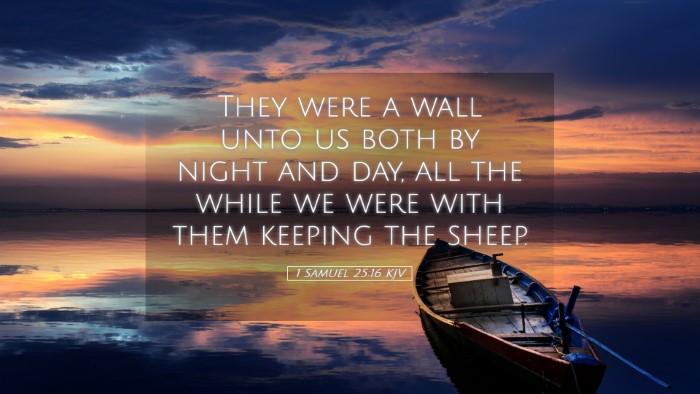Commentary on 1 Samuel 25:16
1 Samuel 25:16 states: "And they were a wall unto us both by night and day, all the while we were with them keeping the sheep." This verse provides a significant insight into the relationship between David's men and the shepherds of Nabal. Here, we explore the context, meaning, and implications of this verse, drawing from the insights of established biblical scholars and commentators.
Contextual Background
The events of 1 Samuel 25 occur during a tumultuous period in David's life. Having fled from Saul, David and his men sought refuge in the wilderness. Nabal, a wealthy but surly and harsh man living in the region, owned extensive sheep and cattle. The context of this verse highlights David's men as protectors rather than aggressors—indicating a commendable moral position amid their hardships.
Analysis of the Verse
This verse captures the essence of mutual support and protection in a time of uncertainty. The phrase "a wall unto us" symbolizes a robust defense and security that Nabal’s shepherds provided against threats. The shepherds, akin to reliable guardians, underscore the significance of community and the notion of mutual aid prevalent in biblical narratives.
Insights from Matthew Henry
Matthew Henry notes that the relationship between David and Nabal highlights a stark contrast between generosity and selfishness. He reflects on how David’s men were not only protectors but also demonstrated kindness and loyalty to Nabal’s servants. Henry emphasizes that their presence served as a shield, providing safety during a time when external threats were prevalent. This bond speaks volumes about the ethical conduct and moral obligations that should govern relationships in the community.
Albert Barnes’ Interpretation
Albert Barnes provides another layer of insight by detailing the nature of the relationship between David’s men and Nabal’s servants. He suggests that their claim of being "a wall" indicates a sense of duty fulfilled by David’s men, who displayed vigilance in their role. He contrasts their behavior with societal expectations of hoarding resources for personal gain. Barnes highlights an essential theme: that the act of protecting others—especially the vulnerable—exemplifies true leadership and reflects the character of God’s appointed leaders.
Adam Clarke’s Commentary
Adam Clarke takes a closer look at the implications of being a "wall." He eloquently argues that this language is metaphorical, encapsulating the idea that protection comes from relationships characterized by trust and service. Clarke points out that the loyalty shown by David’s men, in contrast to Nabal’s selfishness, advocates for a biblical understanding of leadership, one grounded in sacrificial service rather than mere authority. He emphasizes that David’s noble behavior as a protector can serve as a model for modern leaders within the church and community.
Theological Implications
The implications of 1 Samuel 25:16 extend beyond the historical narrative into contemporary theological discussions:
- Community and Responsibility: The verse underscores the biblical principle of community interdependence, where each member plays a crucial role in supporting and protecting one another.
- The Role of Leadership: David’s conduct serves as a model for pastors and leaders today, suggesting that true leadership is characterized by servanthood and protection over authority and domination.
- Divine Providence: The narrative illustrates how God raises up individuals (like David) to provide care and support in times of strife, demonstrating His ongoing presence and provision in the lives of His people.
Practical Applications
As pastors, students, theologians, and Bible scholars reflect on 1 Samuel 25:16, several practical applications arise:
- Building Trust: Cultivating a mutual support system within ministry contexts, promoting a culture of trust and reliable communication.
- Embodying Protectiveness: Encouraging leaders to embody the protective qualities of David, caring for those within and outside of their congregations.
- Acting With Integrity: Adopting a stance of integrity and goodness akin to David’s men, despite societal pressures to act selfishly.
Conclusion
In conclusion, 1 Samuel 25:16 serves as a powerful reminder of the value of loyalty, protection, and sacrificial service. Drawing insights from esteemed commentators such as Matthew Henry, Albert Barnes, and Adam Clarke enriches our understanding of this verse and its multifaceted implications for community, leadership, and divine providence. As we immerse ourselves in the rich tapestry of biblical narratives, let us strive to embody the principles exemplified by David’s men, becoming walls of protection and support in our communities.


